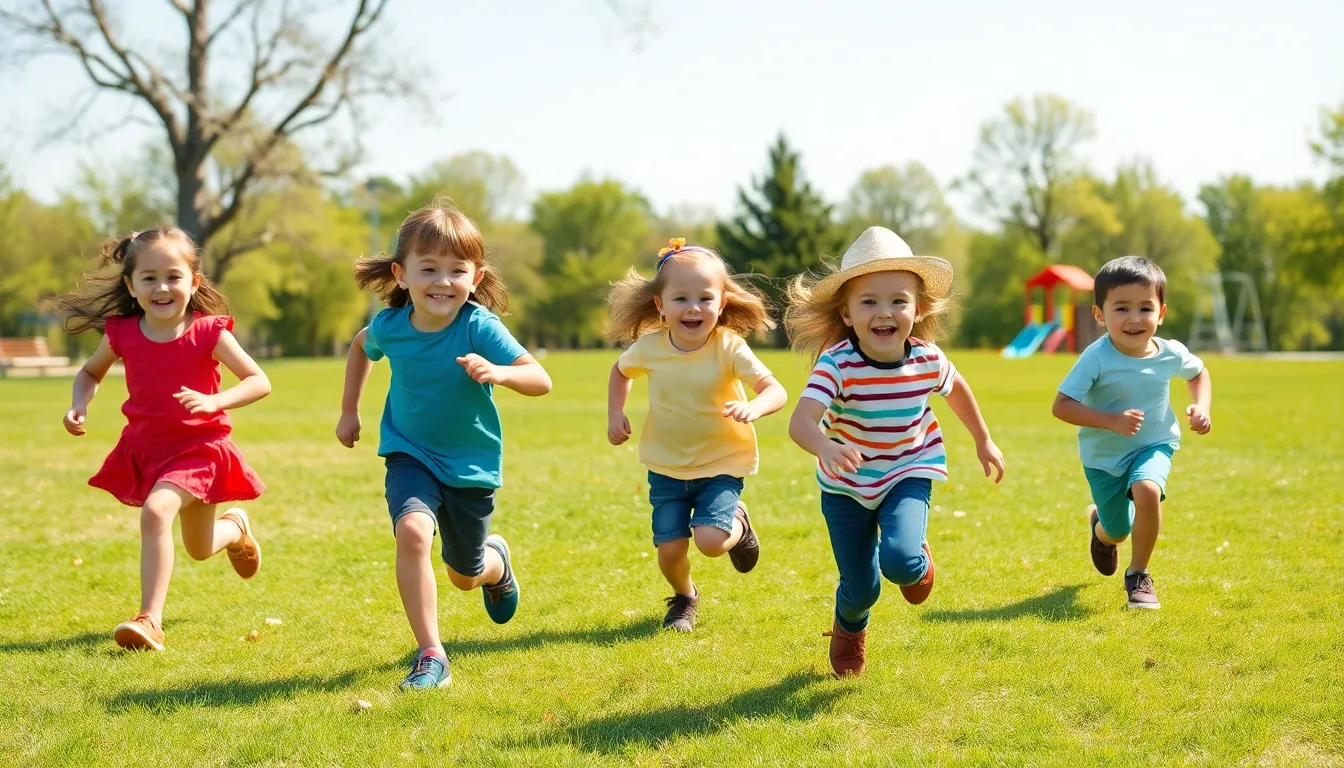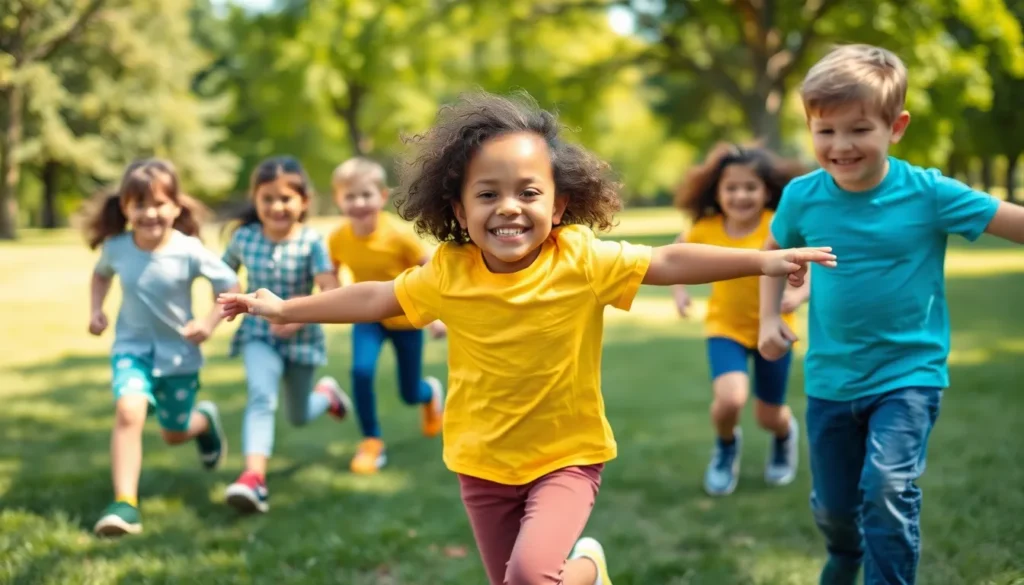Table of Contents
ToggleWhen it comes to preschoolers, nothing beats the great outdoors for fun and learning. Outdoor games not only keep little ones active but also spark their imaginations in ways that indoor play can’t. Imagine a world where kids can run, jump, and giggle their way to developing essential skills—all while getting a healthy dose of fresh air.
Benefits Of Outdoor Games For Preschoolers
Outdoor games foster essential development in preschoolers, offering significant advantages that contribute to their overall growth.
Physical Development
Engaging in outdoor games boosts physical development. Preschoolers enhance motor skills, coordination, and balance through activities like running and jumping. Increased physical activity aids in building strong muscles and bones. Children practicing these movements also improve their cardiovascular health. Active play helps maintain a healthy weight, combating childhood obesity. According to the Centers for Disease Control and Prevention, regular physical activity reduces the risk of chronic diseases. Opportunities for outdoor play create crucial pathways to lifelong healthy habits, benefiting children as they grow.
Social Skills Enhancement
Outdoor games nurture social skills among preschoolers. Children learn to cooperate and take turns during team activities. Sharing toys and equipment fosters friendships and communication. They practice conflict resolution, negotiating rules and resolving disputes as they play. Group games encourage inclusiveness and a sense of belonging, vital for emotional well-being. Research from the American Academy of Pediatrics highlights that social skills gained through play contribute to academic success. Children who engage in outdoor play develop confidence in social interactions, equipping them for future relationships.
Popular Outdoor Games For Preschoolers

Outdoor games for preschoolers promote fun while enhancing physical and social development. Several classic and innovative games engage children, helping them learn essential skills.
Classic Games
Tag, a popular classic game, encourages running and chasing, which improves cardiovascular health. Duck, Duck, Goose fosters social interaction by requiring children to take turns and make quick decisions. Simon Says enhances listening skills while adding an element of fun. Hide and Seek combines excitement with problem-solving as children find teammates, improving their spatial awareness. These games provide opportunities for cooperation and teamwork, vital components for social growth.
Innovative Games
Obstacle courses offer a creative twist on physical play. Children navigate various challenges, developing motor skills and coordination effortlessly. Nature scavenger hunts encourage exploration and observation, allowing kids to connect with their environment while learning about different plants and animals. Water balloon tosses combine laughter with hand-eye coordination practice, making learning fun. Relay races foster teamwork and friendly competition, highlighting the spirit of collaboration.
Tips For Organizing Outdoor Games
Organizing outdoor games for preschoolers requires careful planning to ensure safety and enjoyment.
Safety Considerations
Prioritizing safety transforms outdoor play into a secure experience. Use age-appropriate games to minimize the risk of injury. Assess the play area for hazards like sharp objects or uneven terrain. Monitor the children closely, especially during active games that involve running or climbing. Set clear rules for participation, helping children understand limits and boundaries. Ensure adequate supervision by having adults present during playtime. This oversight promotes a safer, more enjoyable environment for everyone involved.
Equipment Needed
Choosing the right equipment enhances outdoor game quality. Select items that are safe and engaging for preschoolers, such as soft balls, cones, and colorful hula hoops. Use jump ropes to develop coordination and balance during play. Consider incorporating items like buckets for relay races and bean bags for tossing games. Provide sufficient gear to accommodate the number of participants, ensuring everyone has the opportunity to join in. This thoughtful selection of equipment helps maintain excitement and encourages active participation.
Encouraging Participation
Encouraging preschoolers to participate in outdoor games is vital for their overall development. Activities must engage their interests to ensure maximum participation.
Engaging Activities
Fostering enthusiasm for play starts with engaging activities. Scavenger hunts can captivate a child’s curiosity, prompting them to explore and discover. Obstacle courses offer an adventurous challenge, inviting them to run, jump, and climb. These games not only encourage physical activity but also enhance problem-solving skills. Incorporating themes, such as nature or favorite characters, can make these activities even more appealing. Bright colors and visual elements capture children’s attention, increasing their eagerness to join in. Group-based games, such as tag or duck, duck, goose, promote social interaction and teamwork, making outdoor play more enjoyable.
Motivational Strategies
Applying motivational strategies boosts engagement in outdoor games. Positive reinforcement encourages participation; praise children for their efforts to promote a sense of achievement. Setting achievable goals can help maintain enthusiasm, allowing players to celebrate small victories. Children often thrive in teams. Organizing group challenges fosters camaraderie and provides social support. Stories or role models can inspire excitement about physical activities. Demonstrating fun game variations or challenges keeps the experience fresh, sparking their imagination. Engaging parents and caregivers in play activities enhances excitement and creates a supportive environment for participation.
Embracing outdoor games for preschoolers paves the way for a well-rounded development experience. These activities not only promote physical fitness but also nurture creativity and social skills. By engaging in fun and interactive games, children build essential motor skills and learn to work together in a team setting.
Parents and caregivers play a vital role in facilitating these experiences. By creating a safe and inviting environment, they can inspire a love for outdoor play that lasts a lifetime. Incorporating a variety of games ensures that every child finds something they enjoy, making outdoor play a delightful and beneficial part of their daily routine.







